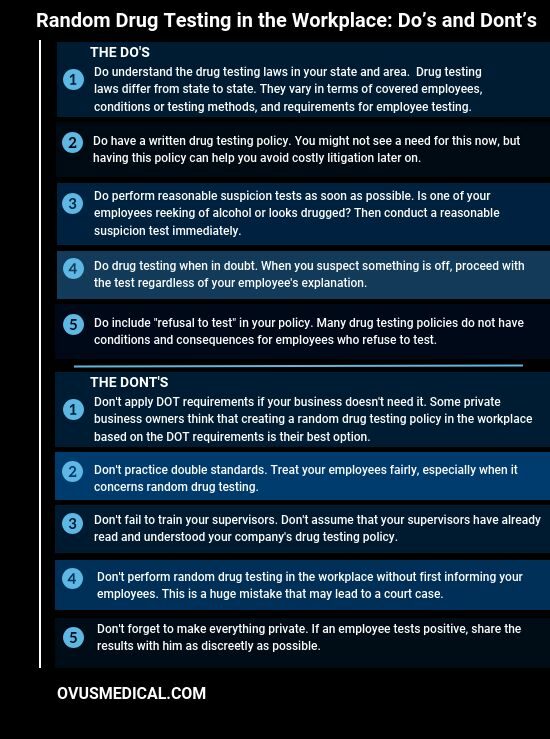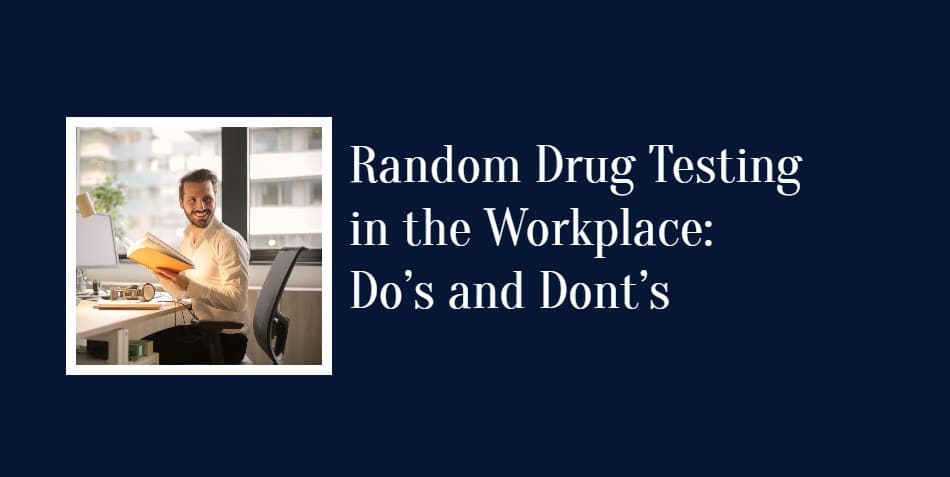Companies that perform random drug testing in the workplace implement it to promote health and safety in the workplace; prevent accidents and fatalities; improve productivity, and improve profitability and sustainability.
Most company owners still thinking of including random drug testing in the workplace ask this: how to implement it properly and legally? What are the do’s and don’ts when it comes to this testing process?
Do’s of Random Drug Testing in the Workplace
- Do understand the drug testing laws in your state and area. Drug testing laws differ from state to state. They vary in terms of covered employees, conditions or testing methods, and requirements for employee testing. That’s why you need to familiarize yourself with the laws governing your particular state.
- Do have a written drug testing policy. You might not see a need for this now, but having this policy can help you avoid costly litigation later on. This policy should include your company’s reasons for testing, the people authorized to perform the drug test, and which employees should undergo testing. It should also include the consequences employees will face if they violate the terms and conditions stated in the policy.
- Do perform reasonable suspicion tests as soon as possible. Is one of your employees reeking of alcohol or looks drugged? Then conduct a reasonable suspicion test immediately. It’s because substances like alcohol leave the body eight hours after consumption. The more you wait, the more chances your suspected person can test negative.
- Do drug testing when in doubt. Let’s take the employee in #3 as an example. He appears drowsy, drugged, and stares blankly at the wall. When you ask him what his problem is, he says he didn’t get enough sleep. This is where some employers make a mistake. They believe their employee’s explanation instead of following through with a drug test. When you suspect something is off, proceed with the test regardless of your employee’s explanation.
- Do include “refusal to test” in your policy. Many drug testing policies do not have conditions and consequences for employees who refuse to test. Your policy should state these very clearly and effectively.
Don’ts of Random Drug Testing in the Workplace
- Don’t apply DOT requirements if your business doesn’t need it. Some private business owners think that creating a random drug testing policy in the workplace based on the Department of Transportation requirements is their best option. Doing so can compromise your business. It’s because different states have different laws on drug testing. What may be legal and just in one state might be illegal and unjust in another.
- Don’t practice double standards. Treat your employees fairly, especially when it concerns random drug testing. Don’t drug test one employee because he is of a different race or color. Otherwise, you might end up in court due to a racial discrimination claim.
- Don’t fail to train your supervisors. Don’t assume that your supervisors have already read and understood your company’s drug testing policy. More often than not, these professionals haven’t even opened it yet. How will they know which employees should undergo random drug testing if they don’t know the signs to look for?
- Don’t perform random drug testing in the workplace without first informing your employees. This is a huge mistake that may lead to a court case. You must inform the persons who need to take a drug test on the same day. If you don’t, your employee can sue you.
- Don’t forget to make everything private. If an employee tests positive, share the results with him as discreetly as possible. The least an employee would want is to have his condition divulged in front of his co-workers.
These are the do’s and don’ts of random drug testing in the workplace. We hope you can use them when creating your company’s drug testing policy.

If you need more information on this topic, visit the Ovus Medical Blog.
